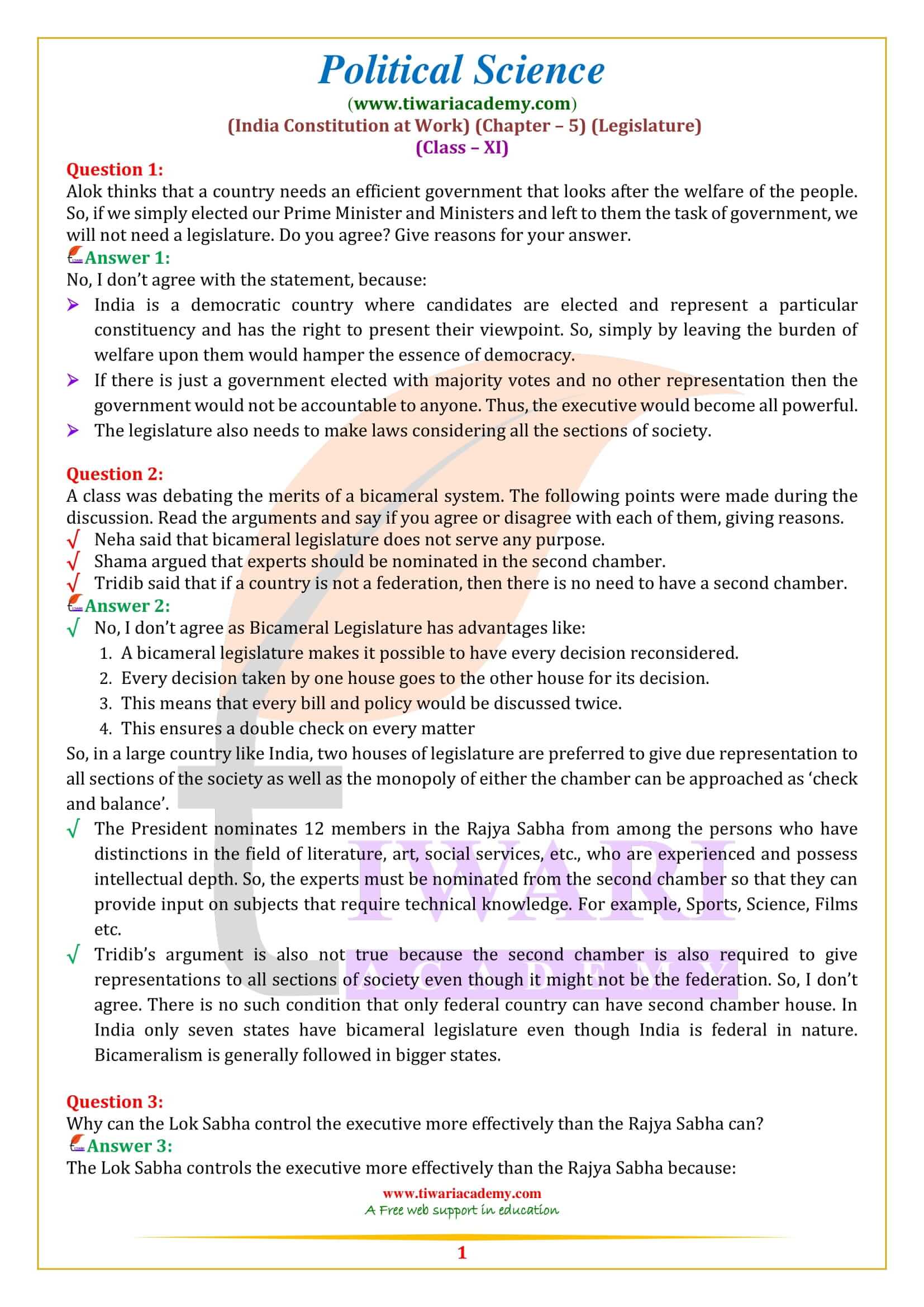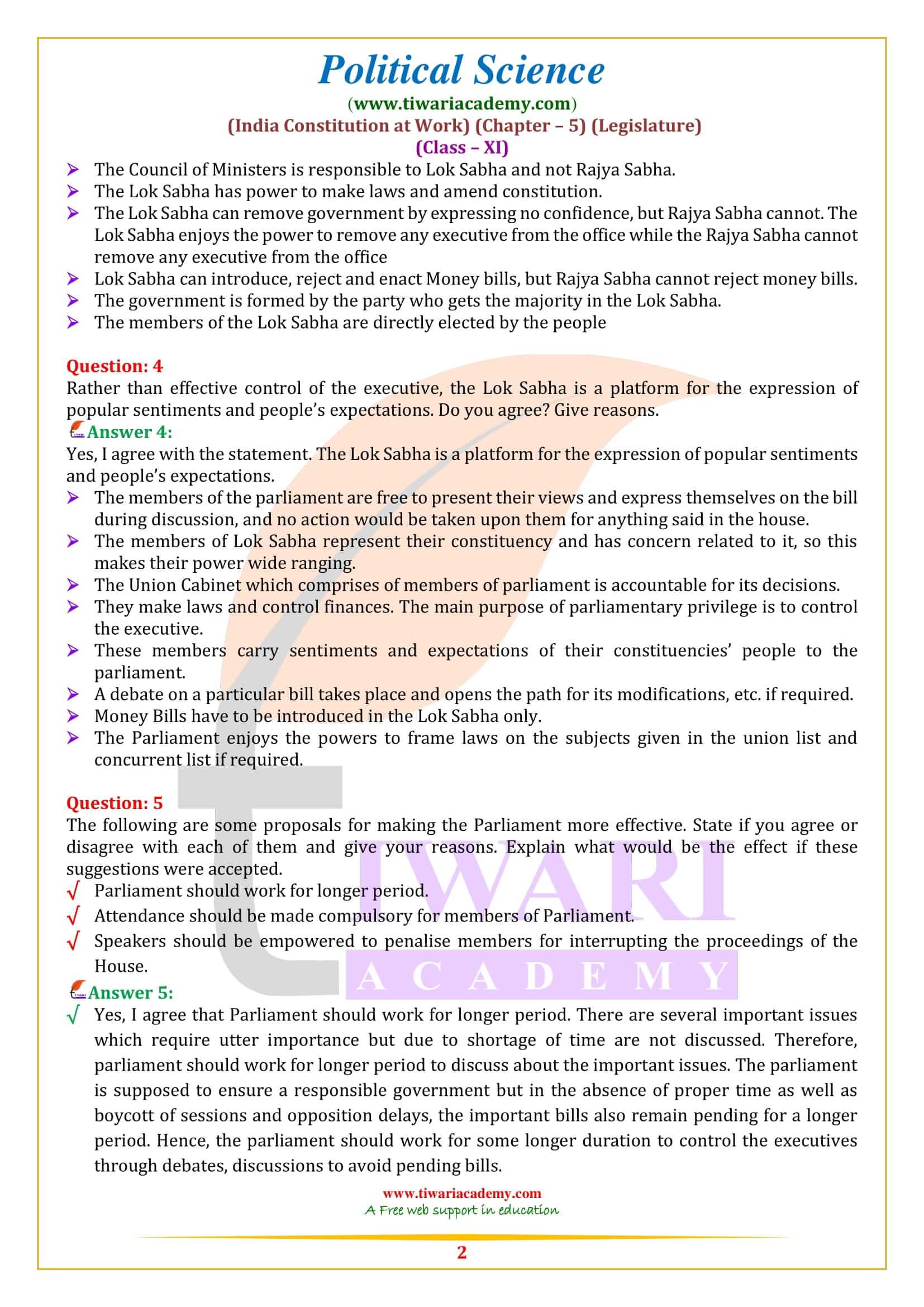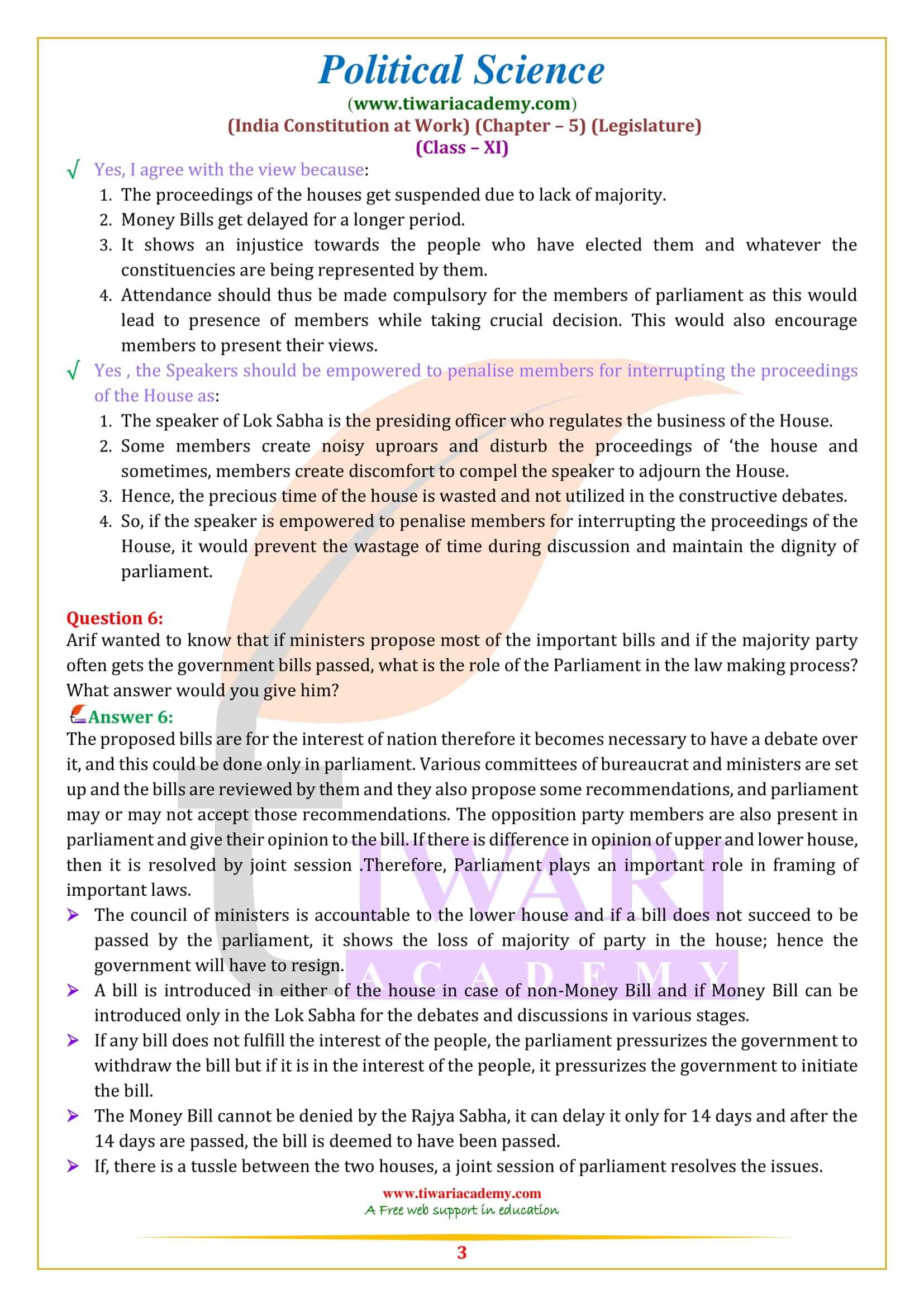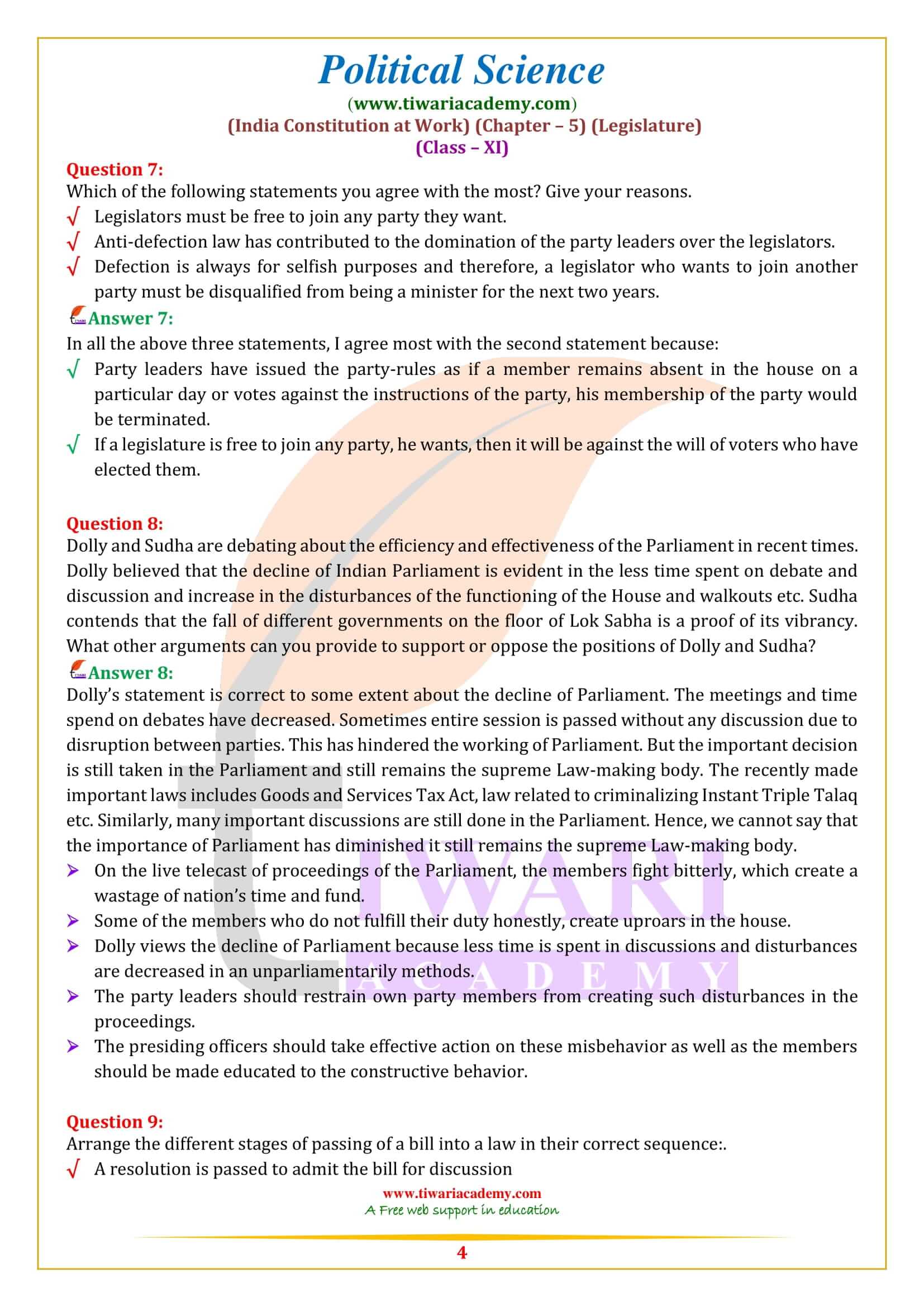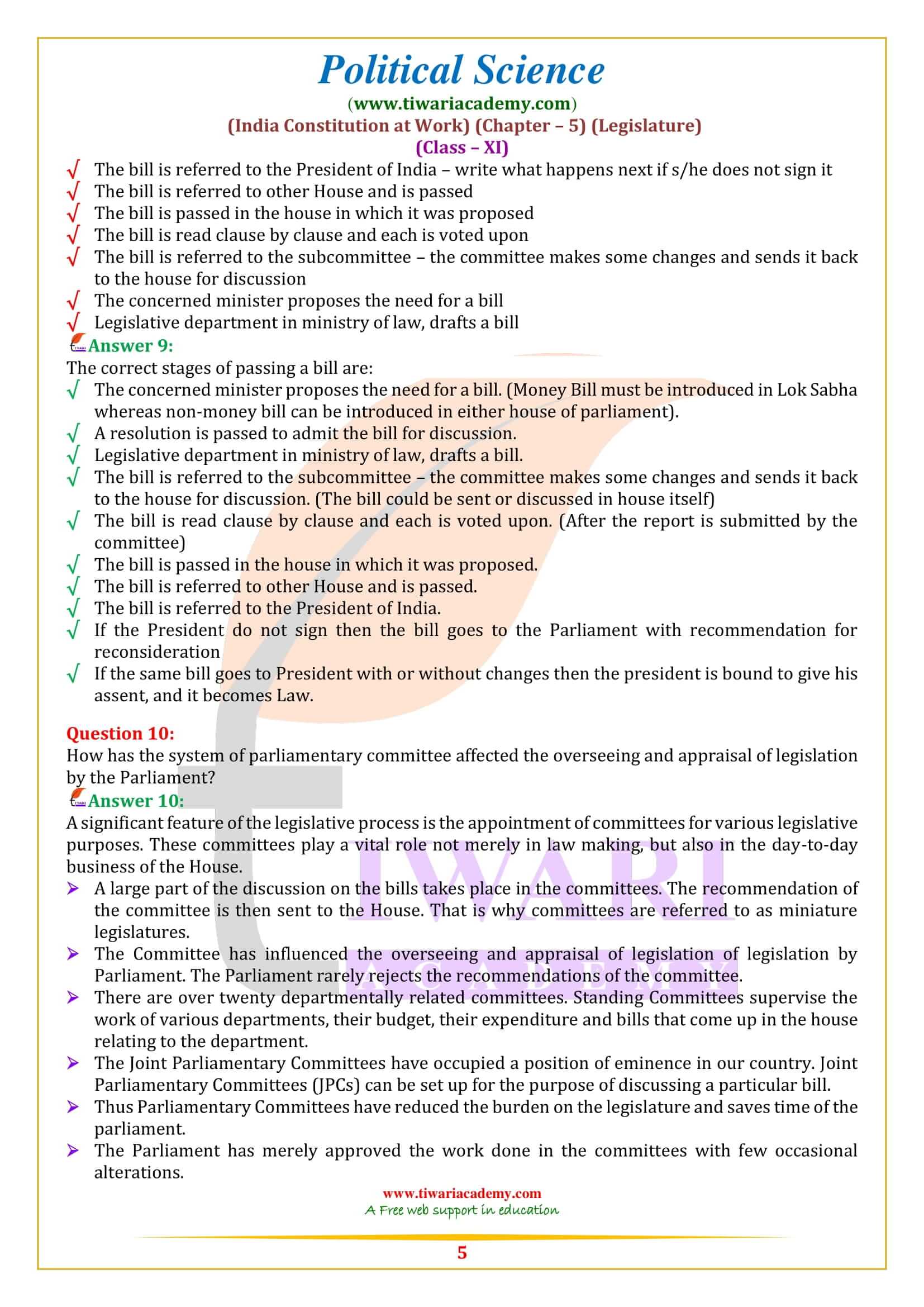NCERT Solutions for Class 11 Political Science Chapter 5 Legislature in Hindi and English Medium question answers and extra questions updated for new session 2025-26. Get all the answers in simple format easy to learn and understand for class 11 Political Science from the text book Indian Constitution at Work.
NCERT Solutions for Class 11 Political Science Chapter 5
Alok thinks that a country needs an efficient government that looks after the welfare of the people. So, if we simply elected our Prime Minister and Ministers and left to them the task of government, we will not need a legislature. Do you agree? Give reasons for your answer.
No, I don’t agree with the statement, because:
- India is a democratic country where candidates are elected and represent a particular constituency and has the right to present their viewpoint. So, simply by leaving the burden of welfare upon them would hamper the essence of democracy.
- If there is just a government elected with majority votes and no other representation then the government would not be accountable to anyone. Thus, the executive would become all powerful.
- The legislature also needs to make laws considering all the sections of society.
Why can the Lok Sabha control the executive more effectively than the Rajya Sabha can?
The Lok Sabha controls the executive more effectively than the Rajya Sabha because:
- The Council of Ministers is responsible to Lok Sabha and not Rajya Sabha.
- The Lok Sabha has power to make laws and amend constitution.
- The Lok Sabha can remove government by expressing no confidence, but Rajya Sabha cannot. The Lok Sabha enjoys the power to remove any executive from the office while the Rajya Sabha cannot remove any executive from the office.
- Lok Sabha can introduce, reject and enact Money bills, but Rajya Sabha cannot reject money bills.
- The government is formed by the party who gets the majority in the Lok Sabha.
- The members of the Lok Sabha are directly elected by the people.
Rather than effective control of the executive, the Lok Sabha is a platform for the expression of popular sentiments and people’s expectations. Do you agree? Give reasons.
Yes, I agree with the statement. The Lok Sabha is a platform for the expression of popular sentiments and people’s expectations.
- The members of the parliament are free to present their views and express themselves on the bill during discussion, and no action would be taken upon them for anything said in the house.
- The members of Lok Sabha represent their constituency and has concern related to it, so this makes their power wide ranging.
- The Union Cabinet which comprises of members of parliament is accountable for its decisions.
- They make laws and control finances. The main purpose of parliamentary privilege is to control the executive.
- These members carry sentiments and expectations of their constituencies’ people to the parliament.
- A debate on a particular bill takes place and opens the path for its modifications, etc. if required.
- Money Bills have to be introduced in the Lok Sabha only.
- The Parliament enjoys the powers to frame laws on the subjects given in the union list and concurrent list if required.
Arif wanted to know that if ministers propose most of the important bills and if the majority party often gets the government bills passed, what is the role of the Parliament in the law making process? What answer would you give him?
The proposed bills are for the interest of nation therefore it becomes necessary to have a debate over it, and this could be done only in parliament. Various committees of bureaucrat and ministers are set up and the bills are reviewed by them and they also propose some recommendations, and parliament may or may not accept those recommendations. The opposition party members are also present in parliament and give their opinion to the bill. If there is difference in opinion of upper and lower house, then it is resolved by joint session. Therefore, Parliament plays an important role in framing of important laws.
- The council of ministers is accountable to the lower house and if a bill does not succeed to be passed by the parliament, it shows the loss of majority of party in the house; hence the government will have to resign.
- A bill is introduced in either of the house in case of non-Money Bill and if Money Bill can be introduced only in the Lok Sabha for the debates and discussions in various stages.
- If any bill does not fulfill the interest of the people, the parliament pressurizes the government to withdraw the bill but if it is in the interest of the people, it pressurizes the government to initiate the bill.
- The Money Bill cannot be denied by the Rajya Sabha, it can delay it only for 14 days and after the 14 days are passed, the bill is deemed to have been passed.
- If, there is a tussle between the two houses, a joint session of parliament resolves the issues.
How has the system of parliamentary committee affected the overseeing and appraisal of legislation by the Parliament?
A significant feature of the legislative process is the appointment of committees for various legislative purposes. These committees play a vital role not merely in law making, but also in the day-to-day business of the House.
- A large part of the discussion on the bills takes place in the committees. The recommendation of the committee is then sent to the House. That is why committees are referred to as miniature legislatures.
- The Committee has influenced the overseeing and appraisal of legislation of legislation by Parliament. The Parliament rarely rejects the recommendations of the committee.
- There are over twenty departmentally related committees. Standing Committees supervise the work of various departments, their budget, their expenditure and bills that come up in the house relating to the department.
- The Joint Parliamentary Committees have occupied a position of eminence in our country. Joint Parliamentary Committees (JPCs) can be set up for the purpose of discussing a particular bill.
- Thus Parliamentary Committees have reduced the burden on the legislature and saves time of the parliament.
- The Parliament has merely approved the work done in the committees with few occasional alterations.
